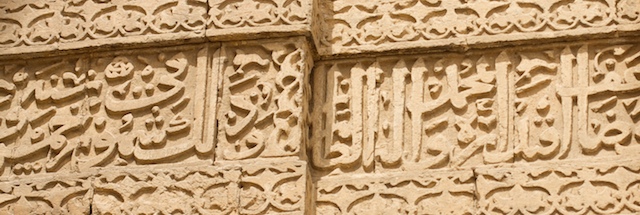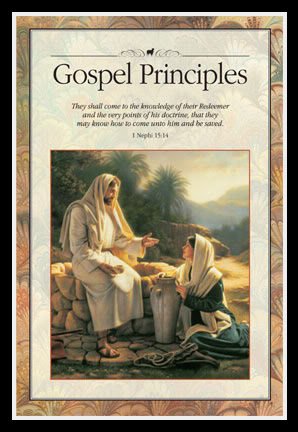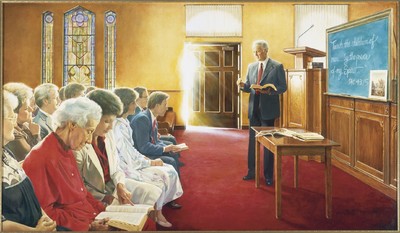-
•
•
3 responses
As Maren Mecham continues her guest run here at T&S, we’d like to cordially welcome our newest guest blogger, Dane Laverty. Dane is a resident of Salem, Oregon and Sacramento, California. He graduated from BYU in contemporary dance, supports his family as a computer programmer, and is attending Willamette University as a business student. Thoughtful and well-read, Dane is certain to have some great posts in store. Please give him a warm and hearty T&S welcome. Read More
-
•
•
72 responses

The several parallels between the Book of Mormon and the Qur’an have been noted before: the Qur’an serves as proof of Muhammad’s prophethood, an additional (although superseding) witness of the Bible’s God and salvation history, the source of devotional reading and instruction for believers. It is central to the piety of Muslims and commands their highest esteem. For non-believers to glibly dismiss it offends Muslims the same way we take umbrage when the Book of Mormon is described as something any nineteenth-century, Bible-literate yokel could have tossed off between lunch and dinner. In other ways, though, the Qur’an is simply… Read More
-
•
•
11 responses
From the Letter from Birmingham Jail: There was a time when the church was very powerful–in the time when the early Christians rejoiced at being deemed worthy to suffer for what they believed. In those days the church was not merely a thermometer that recorded the ideas and principles of popular opinion; it was a thermostat that transformed the mores of society. Whenever the early Christians entered a town, the people in power became disturbed and immediately sought to convict the Christians for being “disturbers of the peace” and “outside agitators.”‘ But the Christians pressed on, in the conviction that… Read More
-
•
•

These notes focus on Moses 4, giving less attention to the other scriptures for this lesson. However, the other readings are necessary to understanding chapter 4. (The study questions for Moses 4:1-4 were part of the materials for lesson 2. I repeat them here so that they will be convenient.) Note that if Moses 2 tells of the spiritual creation (as is commonly but not universally believed among Latter-day Saints), then chapters 3 and 4 correspond to Moses 2:24-30, the sixth day. That would mean that carrying out the physical aspect of each day’s creation involved considerably more than we… Read More
-
•
•
10 responses

I think that viewing the magnitude of human trauma in Haiti right now is similar to trying to mentally envision the difference between a 1000 and a 2000 sided object – we can’t really do it. Read More
-
•
•
82 responses

Several months ago, I temporarily transfered from a place where personal vanity is refreshingly low (Vermont) to a place where it is remarkably high (Northern Virginia) and it has caused me to ponder the following question: is there such a thing as righteous vanity? Read More
-
•
•
83 responses

I confess that I am not a regular reader of the Church News, but I did happen to run across this recent piece, “Using proper sources.” I will note a couple of quibbles I have with the piece (which, as an unsigned post in the “Viewpoints” section, I take to be essentially a staff editorial), but in the end I think I agree on the need to avoid the use of “uncorrelated” supplementary sources or materials in class. Read More
-
•
•
6 responses
SUMMER SEMINAR ON JOSEPH SMITH “The Foundations of Mormon Theology: The Nature of God and the Human” Brigham Young University June 1-July 9, 2010 In the summer of 2010, Brigham Young University, with the generous support of the Mormon Scholars Foundation, will sponsor a summer seminar for graduate students and advanced undergraduates on the theme of Mormon theological foundations. The seminar will be held on the BYU campus in Provo, Utah, from June 1 to July 9. Admitted participants will receive a stipend of $3000 plus a housing subsidy if needed. The seminar continues the series of seminars on Joseph Smith… Read More
-
•
•
145 responses

As is usually the case, when Times & Seasons is mentioned by another news outlet (in this case, the Salt Lake Tribune), some of their readers come here. And, today, some of them sound pretty mad. First, I’d like to point out that if you are also visiting us for the first time, the kinds of comments you find on that post are not our normal fare. Please come back in a few days when the drive-by commenters have left. Second, we’ve closed comments on that post because so many of them violated the spirit if not the letter of… Read More
-
•
•
19 responses
Middle Eastern foods are my favorite. So at the risk of totally overstepping the bounds as a T&S guest blogger, I offer the following to enhance one’s study of the Old Testament and further an appreciation of ancient culture. May you have your meal with gladness and health! Read More
-
•
•
130 responses

Times and Seasons has selected Harry Reid as Mormon of the Year for 2009. During 2009, Senate Majority Leader Harry Reid was the most visible and influential Mormon politician in the world, shepherding Democratic legislative proposals through the U.S. Senate after the party’s victories in the 2008 elections, including a landmark health care bill that represents one of the more controversial pieces of legislation to pass through the Senate in recent memory. Reid’s off-the-cuff style has also led occasionally to unscripted remarks that have attracted a lot of attention. While Reid’s faith is not always discussed as much as that… Read More
-
•
•
7 responses

Light and shadow are the essence of photography. Where light and shadow are together, there is something to see and an image can be made. These polar opposites make up the visual part of this life; they are both required in order to see anything. Opposites are necessary in order to understand. I believe that most things in life have their opposite. Order and chaos. Gorgeous September days and ice storms in March. Chocolate cake and pickled eggs. Sometimes the opposite of something is not as simple as we were taught when we were young… compassion and hatred are opposites… Read More
-
•
•
9 responses
We are delighted to welcome Maren Mecham as a guest for the next couple weeks. Maren Mecham is a native Northern Virginian, earned her BFA from BYU and was a photographer for the church before moving to Palo Alto, CA, where she produced portraits and computer graphics. She has lived in the East, Northeast, Midwest, Intermountain West, California, Norway, Egypt and Turkey. She is married to a Middle East political scientist who is a professor in Vermont, but they temporarily live in Virginia while he is on sabbatical and is working in DC. She is raising 2 girls and 2 boys.… Read More
-
•
•
3 responses
A reminder about these notes: They are intended to help people study the assigned material for this week’s Sunday School lesson. They are not intended as an outline for how to teach that lesson, though I assume that by studying the material a person might get ideas about how to teach it. And a note about these notes: These questions are for one particular kind of study, not the only kind nor necessarily the best kind. Sometimes we study a book of scripture from cover to cover, learning or reminding ourselves of its overall teachings and how the parts of… Read More
-
•
•
34 responses

The Church has reportedly just purchased a couple large plots of land in downtown Salt Lake, including “a 10-acre block directly north of the Little America Hotel and another 2- to 3-acre parcel directly north of the Grand America Hotel. The parcels are across from each other on either side of Salt Lake City’s Main Street.” It currently seems to be just two large parking lots. The official word is that it’s a long-term investment and the Church has no immediate plans for development. Any idle speculation as to what the Church might use the land for? Read More
-
•
•
38 responses

My second-favorite group blog recently posted a series on what’s wrong with Sunday School, showing once again that we bloggers are, if nothing else, talented complainers. So let’s talk teaching and collect a few simple suggestions for improvement. Read More
-
•
•
7 responses

As I’ve mentioned before, Mormons don’t follow the traditional liturgical calendar, but that won’t stop me from using this January 6, the twelfth day of Christmas and the feast of Epiphany or Three Kings Day, as a happy occasion to put up the one last Christmas post that escaped December. (It’s also a great reason to enjoy my Christmas decorations—and avoid the chore of taking them down—for just one… more… night.) Several days before Christmas I attended a concert by the St Louis Chamber Chorus at the Cathedral Basilica. I’ve attended this concert most years that I’ve lived in St… Read More
-
•
•
35 responses
Gospel Principles Lesson One: Our Heavenly Father Read More
-
•
•
2 responses

A different idea of history What I say here about the Old Testament will be brief, so brief in fact as to be a caricature. Those who are specialists in biblical studies, are likely to find this woefully inadequate. I plead mea culpa in advance. In spite of that, I think this will do as a brief introduction for lay people like myself. Latter-day Saints believe that, for the most part, the scriptures are literal histories of different groups of God’s people. The word “literal” means “by the letter.” So, when we say that the scriptures are literally true, we… Read More
-
•
•
Abraham 3 Verses 1-19: Why did the Lord reveal these things to Abraham? More important: why did he think it important to reveal them to us? Verse 1: Why is it important that Abraham tell us that he received the revelation that follows through the Urim and Thummim? Verse 2: Assuming that the throne of God is on a planet, why say that the star is near that throne / planet rather than that the throne / planet is near the star? In contrast, we don’t say that the sun is near the earth, but that the earth is near… Read More
-
•
•
7 responses
A new century dawns upon the world today. The hundred years just completed were the most momentous in the history of man upon this planet. It would be impossible in a hundred days to make even a brief summary of the notable events, the marvelous developments, the grand achievements, and the beneficial inventions and discoveries, which mark the progress of the ten decades now left behind in the ceaseless march of humanity. The very mention of the nineteenth century suggests advancement, improvement, liberty, and light. Happy are we to have lived amidst its wonders and shared in the riches of… Read More
-
•
•
25 responses
There’s an interesting article by Peggy Fletcher Stack about some of the changes in the revised _Gospel Principles_ manual. Among other things, references to _Mormon Doctrine_ have been removed. T&S’s Julie Smith asks some good questions — “Over the years, I’ve heard many, many people express that the Teachings of the Prophets books were very difficult to teach from, so I’m sensing some relief with the shift to the new manuals,” says Julie M. Smith, a stay-at-home mom with a degree in biblical studies. “At the same time, there is a new concern: How does a teacher make a lesson… Read More
-
•
•
131 responses
This post opens the voting for Mormon of the Year. Votes will be taken until midnight Eastern Time on Thursday, January 7th, at which time the voting will close. The voting mechanism will attempt to restrict votes to one per person. The order of the choices is set at random, and is different each time the form is presented. THE WINNER OF THE ONLINE VOTE IS NOT NECESSARILY THE MORMON OF THE YEAR!!! Read More
-
•
•
16 responses
Following up on Kaimi’s post concerning “It Came Upon a Midnight Clear,” I thought we ought to take the opportunity to read over the full text of Lord Tennyson’s “Ring Out Wild Bells,” another frequently sung hymn whose lines concerning injustice, social inequity, political divisiveness, and faith we never sing! Read More
-
•
•
4 responses
December, like childhood, is an opportunity for us to experience an enchanted world, and regain some of the understanding we too quickly lose – and often anxiously jettison – after childhood. Read More
-
•
•

As the title of this post says, these are notes for studying the lesson rather than for teaching it, though presumably one who studies the lesson will have material from which to teach it. Read More
-
•
•

What are the scriptures for? How should we use them? How do we use them? “Proof-texting” is a procedure that begins by assuming we know the doctrines and then searches through the scriptures to find something to back up the belief. Because it begins with what we assume we know rather from what the scriptures teach, proof-texting always runs the danger of “wresting” the scriptures. Jesus accuses the Jews of wresting the scriptures by proof-texting in John 5:39. See also 2 Peter 3:16, Alma 13:20, and D&C 10:63. “Wrest” is the word from which the modern word “wrestle” comes, and… Read More
-
•
•
Don’t expect Old Testament writers to have written their histories the way we would have written them. Read More
-
•
•
53 responses
It appears that several church programs are changing in 2010. Read More
-
•
•
2 responses
We’re very lucky to have had Eric blogging with us for the past few weeks. Thank you, Eric! Read More
